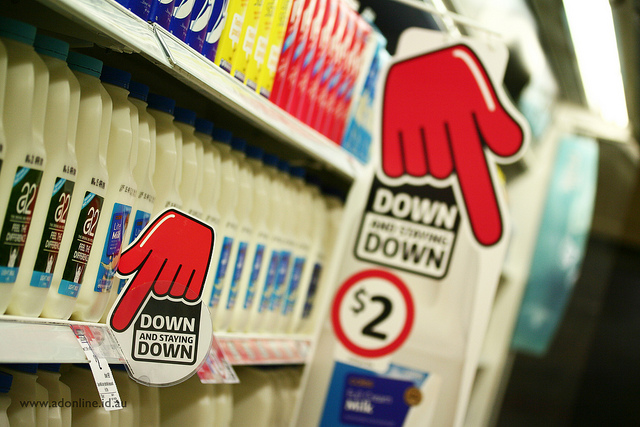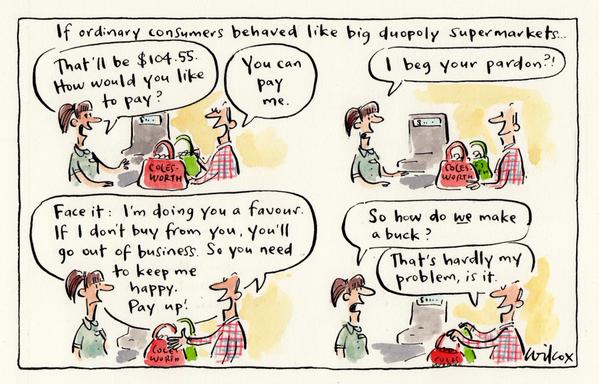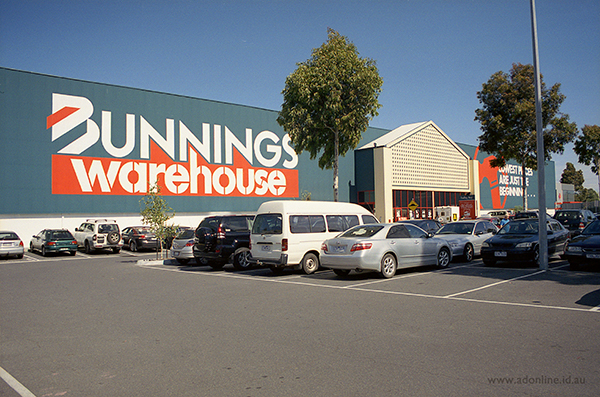Australian Oligopolies
Complaints about the allegedly oligopolistic behaviour of Australia’s major supermarkets are frequent, but weak competition policy is largely to blame.
In Australia, two major supermarket chains (Coles and Woolworths) control approximately 70-80% of market share which, by any industry standards, is a lot. The remaining 30% could be described as a boutique niche and is occupied by the IGA group, Aldi and a raft of smaller independent operators.

If you’ve ever noticed your favourite brand of food product slowly disappear from the supermarket shelves, been forced into being your own cashier or wondered how a farmer could make any money when a lettuce is selling for 60c, then you’ve probably put some thought into the market dominance of these two massive Australian companies.
In August 2014, The Monthly magazine published a lengthy essay by Malcolm Knox which detailed allegations of abuses of market power by both chains. In it, Knox described how farmers were battling to get a decent price for produce against two businesses who are prepared to drive down costs at any price. He also described the phenomenon of ‘supplier rebates’, where Coles and Woolworths allegedly charge their suppliers for shelf space and other advantages. The allegation is that those businesses who refuse to pay for shelf space have their products relegated to the bottom shelf, or have their product discontinued.
Knox’s allegations aren’t the first. There was much disquiet when Coles introduced its $1 per litre home-brand milk campaign on Australia Day, 2011. Following the successful “down, down” marketing blitz, the move was designed to take business away from other supermarkets. The problem for other producers was that their milk suddenly became price uncompetitive and the company that supplied milk to Coles was struggling then to remunerate farmers adequately. Within days, Woolworths also dropped the price of their milk to $1 and the effects rippled throughout the dairy industry.

In 2011, Woolworths told the ABC that the “milk wars” were unsustainable, yet the Australian Competition and Consumer Commission (ACCC) found that Coles had not engaged in predatory pricing. In fact, ACCC chairman Graeme Samuel said that Coles $1 milk had “…benefited consumers who purchase house brand milk”. The Competition and Consumer Act 2010 prohibits businesses that have substantial market power from taking advantage of that power for the purpose of eliminating or substantially damaging a competitor, preventing the entry of a person into a market and/or deterring or preventing a person from engaging in competitive conduct in a market. In this instance, the Act wasn’t breached.
Competition law in Australia isn’t without merit. Consumer protections in Australia are very strong and provide the purchasers of goods with many rights. This provides sellers with a strong obligation to make sure that the products they sell are of reasonable quality, ‘fit for purpose’ and fosters public confidence in retailers.
Yet the allegations made about Australia’s two biggest supermarket chains highlight the general inadequacy of competition law in Australia (and the ACCC) in dealing with general abuses of market power and alleged quasi-monopolistic behaviour. Whilst the ACCC has been effective in dealing with cartel behaviour in various industries (the Visy/Amcor case comes to mind), little has been done to curtail the problems associated with oligopolies (of which there are many in Australia).

In 2014, South Australian Senator Nick Xenophon introduced the Competition and Consumer Amendment (Misuse of Market Power) Bill 2014 into parliament. Xenophon argued that a mandatory industry code of conduct needs to be established which covers the entire supply chain from supermarkets through to processors and producers. He also argues that the ACCC needs the power to apply to the courts to break-up companies where market power has been abused. In essence, he’s arguing for the introduction of forced divestiture into Australia. Xenophon is strongly supported by Queensland MP Bob Katter.
Forced divestiture is a tool used by regulators to fragment a market with the goal of fostering greater competition. Currently in Australia, it is only in the special case of anticompetitive mergers or acquisitions that the Federal Court may order that an acquirer divest an illegally acquired target or assets. The Federal Court of Australia may also stop an acquisition of shares or assets that would substantially lessen competition in an Australian market, but that’s as far as it goes. Forced divestiture is not a legal option here.
The presence of oligopolies in Australia is alarmingly commonplace. In part, this is a consequence of poor enforcement of competition laws; a neglect which seems to enable major companies to buy each other out regardless of whether it is anticompetitive or not. A good example of this is the purchase of Hardwarehouse by Bunnings Warehouse. Whilst entirely legal, that particular acquisition had the effect of reducing the number of ‘large shed’ hardware store chains in Australia from 2 to 1. How this could not be deemed uncompetitive is incomprehensible, but the ACCC permitted it nonetheless.

If the ACCC was a little more vigilant in preventing uncompetitive mergers, forced divestiture would not be required in Australia. Unfortunately, this is not the case and Australia suffers greatly because of it. It was Andrew Robb, now the Minister for Trade and Investment, who stated that Australia was an “oligopoly economy” and that we should just accept it. Crikey political editor Bernard Keane strongly disagreed, citing petrol, taxis, air travel, telecommunications and groceries as areas of serious concern.
As would be expected, Xenophon’s bill triggered an enquiry, of which four responses were released. Not surprisingly, the Australian National Retailers’ Association was one of the primary objectors. The reason for their objection is obvious and driven by self-interest.
One of the strongest arguments advanced by some in favour of oligopolies is that they enable companies to achieve economies of scale and minimise overheads. The argument is made that such strength would allow Australian firms to grow sufficiently big to compete in foreign markets. So far, there is little evidence of this. Rather, there is evidence in a wide range of Australian industry sectors of price-gouging and general laziness.
Australians appear to be especially poor when it comes to expanding businesses overseas (outside of New Zealand or the UK). There is not one instance of a major Australian multinational company with any degree of international market dominance in any sector. Not one. The oligopolies-are-good theory simply doesn’t hold.
Of course one cannot fault Coles or Woolworths for wanting to grow their businesses as much as possible. Nor any other business that acts legally. That is their right.
The role of any modern government concerned with economic development and prosperity should be to foster competition and drive efficiency in the private sector. That very question of what is and isn’t legal is one for governments to answer through legislative means. It is not unreasonable to expect government to enforce a system of competitive capitalism that rewards enterprise and effort whilst protecting consumers and suppliers from abuses of market power.
Australians like to pride themselves on their egalitarian society. That egalitarianism isn’t merely sustained by a broad middle class of wage-earners. It also comes from a widespread distribution of capital in all its forms including savings, investments and shareholdings. If nothing else, forced divestiture in certain industry sectors would help both the consumer and the investor by distributing capital and market share to a greater number of participants. It would also provide a powerful incentive for successful Australian businesses to consider international expansion which would help the nation considerably.
It’s certainly something to think about.
Comments
3 responses to “Australian Oligopolies”
Capitalism seems to be the best economic system, but it does need to be heavily controlled to prevent its excesses, where given some free rein, we have seen disastrous results around the world. Having said that, so many things in Australia are too cheap. I still cannot fathom how Italian tomatoes can be sold by Coles for 80c a tin when our locally grown tinned tomatoes are double the price. Italy may grow a huge crop and have economies of scale and possibly some cheap illegal labour, but just the shipping must cost a fortune, as you would know if you have ever dropped a tin of tomatoes on your foot.
With the exception of housing costs, Australians are living in the lap of luxury, with cheap imported clothing, cheap imported food, reasonably cheap electronics and paying low wages to service staff. The visible evidence is the huge amount of money Australians seem to have, as anyone who ventured to post Christmas Day sales may have noticed, or even everyday observation of the disposable income we generally seem to have.
It is known that the ACCC has quite limited funding, so maybe this is a reason why it fails to act. If it is not be properly funded, then the legislation proposed by the Senator should be supported.
Italyian “looking” cans of tomatoes are mostly grown in China (some under license from Italian companies) then packaged to look like they came from Italy.